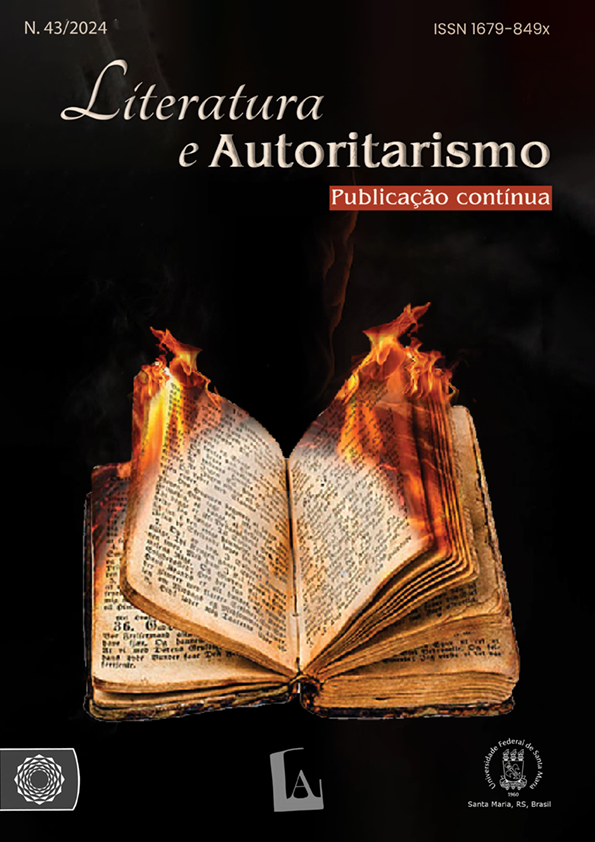O Carapuceiro by Miguel do Sacramento Lopes Gama: Press on an exclusionary Maturity in 19th Century Brazil
DOI:
https://doi.org/10.5902/1679849X88749Keywords:
Press, O Carapuceiro , Enlightenment, Maturity, ExclusionAbstract
This present article, after characterizing the eighteenth-century European moralist press and its reception in Latin America during the nineteenth century, contextualizing them within the framework of Enlightenment thinking and paying special attention to the concept of Mündigkeit (maturity, majority, emancipation), presents the Recife newspaper O Carapuceiro (1832–1847) by Miguel do Sacramento Lopes Gama. Then, through the analysis of fictional texts from the newspaper, it approaches the functionalization of the idea of Mündigkeit, which is present in the narrator’s reflections on Brazilian identity and in its design of an ideal of a national community for Brazil in order and progress, in which religion plays a predominant role and popular cultures of African origin are excluded.
Downloads
References
ADORNO, Theodor W. Erziehung zur Mündigkeit. In: ADORNO, Theodor W. Erziehung zur Mündigkeit: Vorträge und Gespräche mitHellmut Becker 1959–1969. Herausgegeben von Gerd Kadelbach. Frankfurt am Main: Suhrkamp, 2015. s. 133–147.
ANDRADE, Mário de. Macunaíma: o herói sem nenhum caráter. Edição crítica coordenada por Telê Porto Ancona Lopez. Nanterre / Florianópolis: Coleção Arquivos / UFSC, 1988.
CANDIDO, Antonio. Formação da literatura brasileira: Momentos decisivos. 1. ed. Belo Horizonte / Rio de Janeiro: Itatiaia Limitada, 1997.
ERTLER, Klaus-Dieter. Moralische Wochenschriften in Spanien: José Clavijo y Fajardo: El Pensador. Tübingen: Gunter Narr, 2003.
ERTLER, Klaus-Dieter et al. Moralische Wochenschriften: Die „Spectators“ im internationalen Kontext. Graz: Karl-Franzens-Universität Graz, 2011. Erhältlich unter: http://gams.uni-graz.at/context:mws/sdef:Context/get?mode=&locale=de. Letzter Zugriff: 04/08/2024.
ERTLER, Klaus-Dieter. Moralische Wochenschriften. Europäische Geschichte Online (EGO), 2012. Erhältlich unter: http://ieg-ego.eu/de/threads/modelle-und-stereotypen/anglophilie/klaus-dieter-ertler-moralische-wochenschriften. Letzter Zugriff: 03/08/2024,
FUCHS, Alexandra; ERTLER, Klaus-Dieter; HOLZER, Jürgen (Hg.). Mikroerzählungen in den Spectators: Eine Anthologie. Hamburg: Dr. Kovač, 2019.
FERNÁNDEZ, Hans. Poéticas espectatoriales en Hispanoamérica y Brasil (1800–1847): Ilustración – emancipación – convivencias excluyentes. Berlin / Boston: De Gruyter, 2022.
JANIK, Dieter. Die Anfänge einer nationalen literarischen Kultur in Argentinien und Chile: Eine kontrastive Studie auf der Grundlage der frühen Periodika (1800–1830). Tübingen: Gunter Narr, 1995.
KANT, Immanuel. Beantwortung der Frage: Was ist Aufklärung? Berlinische Monatsschrift, Berlin, Heft 12, s. 481–494, 1784.
LOPES GAMA, Miguel do Sacramento. O Carapuceiro: crônicas de costumes. Organização de Evaldo Cabral de Mello. São Paulo: Companhia das Letras, 1996.
MARTENS, Wolfgang. Die Botschaft der Tugend: Die Aufklärung im Spiegel der deutschen Moralischen Wochenschriften. Stuttgart: J. B. Metzlersche, 1968.
PALLARES-BURKE, Maria Lúcia Garcia. Um espectador nos trópicos: estudo de caso sobre produção e reprodução cultural. In:
PALLARES-BURKE, Maria Lúcia Garcia. Nísia Floresta: o carapuceiro e outros ensaios de tradução cultural. São Paulo: Hucitec, 1996. s. 129–165.
RAU, Fritz. Zur Verbreitung und Nachahmung des Tatler und Spectator. Heidelberg: Carl Winter Universitätsverlag, 1980.
Downloads
Published
How to Cite
Issue
Section
License
Copyright (c) 2024 Hans Fernández

This work is licensed under a Creative Commons Attribution-NonCommercial 4.0 International License.
DECLARAÇÃO DE ORIGINALIDADE E EXCLUSIVIDADE E CESSÃO DE DIREITOS AUTORAIS
Declaro que o presente artigo é original e não foi submetido à publicação em qualquer outro periódico nacional ou internacional, quer seja em parte ou na íntegra. Declaro, ainda, que após publicado pela Literatura e Autoritarismo, ele jamais será submetido a outro periódico. Também tenho ciência que a submissão dos originais à Literatura e Autoritarismo implica transferência dos direitos autorais da publicação digital. A não observância desse compromisso submeterá o infrator a sanções e penas previstas na Lei de Proteção de Direitos Autorais (nº 9610, de 19/02/98).






